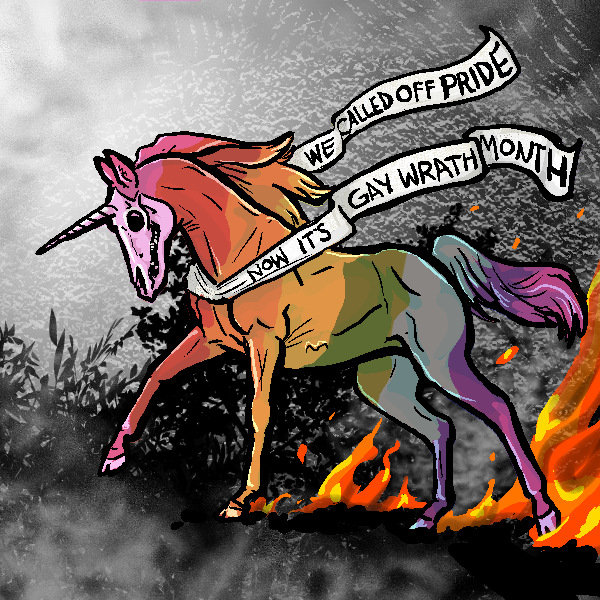"So... everything the Communists ever did cannot be judged?"
"Uh, well, you see..."
And so much of it is made the more absurd because it's defending such recent atrocities. The civil war was in the 19th centuries (the atrocity being slavery and not the civil war, to be clear), as were the robber barons, as was the trail of tears. It always feels insane to treat anything that occurs within the history of the USA as somehow ancient when it's such a young country.
EVERYONE had slaves back then, it was normal.
Y'know, apart from the very prominent abolitionist movement that had incredibly well known public figures backing it and yet was ignored for decades.
No but you don't understand, EVERYONE had slaves back then. I know this because I am a very smart liberal.
But also, my grand pappy didn't own slaves (I promise!) so why should there be reparations?
you have no idea about the amount of pro Confederate brainwashing I was subjected to as a child, from basically every adult I knew (including teachers)
"Not only did EVERYONE have slaves but a lot of slaveowners were kind and generous. Oh and there were white slaves too so it wasn't racist. Oh and the slaveowners would give their slaves presents on Christmas. You see they weren't really oppressed just because they got whipped or whatever, the slaves were like a big family. They even sang songs together. Oh and they became Christians so that's good, right? So they were slaves for a little but they got to go to Heaven, see? :)"
EVERYONE was okay with slavery back then....
You know except the slaves, I bet. But their opinions don't count.
Hmm. Was there any known abolitionist movement way back in Roman times?
Additionally, besides the abolitionist movements within slaving empires, most 'primitive' cultures on Earth either had no slavery or had temporary forms of bondage that didn't reduce people to a tradable piece of property. Without great imperial wars and the international slave trade, slaves were members of the community with rights, rights which would be restored to full status after a time. Still wrong and exploitative, obviously, but in the grand scheme of things the more brutal forms of slavery were unique creations of the strongest and most advanced civilizations, the ones that claimed moral superiority.
The late anarchist anthropologist David Graeber in his book Debt, The First 5000 Years ties the trade in human beings to debt from interest bearing loans and conquest. But even in the societies where debt led to slavery, there were mechanisms like the jubilee, that canceled all debts and released all slaves every 50 years. So it was only conquest and violent seizure of human beings from their communities, the breaking of all social bonds, which permanently reduced them to pieces of property - something that most people most of the time did not practice.
"No one at the time thought slavery was wrong"
Yeah, it's just weird that for as long as slavery was a thing in North America, a tremendous amount of resources were put into making sure slaves couldn't escape or were punished if they did. Also weird how the fears of a slave revolt dominated so much policy and discussion around slavery. I mean, the slaves in Haiti won their independence and the US was openly hostile to the new country for decades, lest that spirit spread here. Yeah yeah the slavers had no idea what they were doing was bad, they just spent their waking hours thinking of how to prevent slaves escaping and worrying about slave revolts...
I get (but don't excuse) how people turn a blind eye towards exploitation in the present day. So much of that exploitation goes relatively unseen - even if it's more like people don't want to see it. But you can't say the same about slavery. Slave owners saw their slaves get brutally beaten. They saw mothers cry as they were separated forever from their kids. They saw the cruelty right in front of them. Of course they did and of course they knew how truly cruel and horrible it all was, otherwise they wouldn't worry so much about slave revolts as they did.
Edit: forgot to add, the scale and severity of slavery in the western hemisphere in the 17th-19th centuries was perhaps historically unique, despite reactionaries saying "SlAvEry aLWaYs ExIsTeD!!!" Yes, many societies had slavery. However, not many had slavery as the economic bedrock of their society, deeply fundamental to how the society operated. There's a historian (can't remember his name) who even though his theories have been somewhat superseded he is largely regarded as correct. He said only 5 true "slave societies" like I described have existed: Ancient Greece and Rome, then the US South, the Carribean, and Brazil in the modern era. And on top of that, the chattel slavery as experienced in North America was also unique in that other societies gave a lot more rights to slaves. In Rome slaves could actually get fairly wealthy. And often there were rules about treatment. But the way in which ownership was so total as well as a lack of any significant protections for the slaves themselves in the US is pretty historically unique.
Also weird how abolitionists existed basically since slavery started
Anywhere I can read more about this? I know slaves have had different existence in history and that American Chattel is one of the worst but Im curious about the greeks and romans.
I know Dan Carlin covers the history of slavery in one of his older "Hardcore History" podcasts, that's where I remember hearing about it.
Similar to this is the standard 'No one at the time thought slavery/genocide etc. was wrong'
Wonder if we asked the people who were crammed into slave ships or forced onto land they couldn't work to watch their children starve what they'd say.
As an argument, it essentially is saying that the victims of the atrocity don't count as people.
The morality of the rulers or the morality of the oppressed? Believe it or not, if there were slave revolts 2-3k years ago the morality didn't change so much that oppressed accept oppression.
Word. When they say "people back then didn't think this was wrong" they're implicitly denying the humanity of the oppressed and enslaved. Abolitionism is born the moment a person is put I shackles, the first time whip meets another's back.
If you watch a mother cry out for her stolen children, a man plead for a moment of respite from back braking labour , a child beg for more food, and you don't see that slavery is wrong then you're a monster.
Just point them to the famous slave rebellion in the bible and watch their head spin
Well the classic one is when Moses led the slaves out of Egypt. Christians love that shit.
No, when smooth brains say “u can’t judge morality if it happened in the past” like there’s a statute of limitations for morals and ethics.
There is a conception that morality is basically a social convention that is spatially and temporally local like fashion or something.
I mean, that's not wrong. Of course, 'what is (im)moral' is specific to a specific culture in time. For the nazis it wasn't just legal to kill Jews, it was the moral thing to do; protecting the race/country n shit.
That is to say that morals just aren't the perfect compass some like to believe they are. Morals function as a navigational tool within a culture - but quickly seize to work that way, once we're talking about larger scale issues.
it was the moral thing to do
No, it wasn't. Just cause the fascist state tells you something doesn't make it moral. Why else would've been my great uncle have been in a concentration camp (most of my older ancestor were not cool, though)?
Besides that, it really isn't ideal to take the Nazis and Shoa to draw examples from, cause details matter.
Though I get an angle you come from which is that for certain cultural community goals they become norms.
Just cause the fascist state tells you something doesn’t make it moral.
The fascist state didn't have to tell people shit, it emerged from what people thought was moral in the first place. Nazi soldiers weren't acting in the full knowledge of being 'the baddies' - in their worldview they were the 'good guys', the moral defenders of the German Volk. That's what's so insidious about morals in the first place, they do get constructed and warped through socialization
Edit: if you hate the nazi example, think of cultures where religious human sacrifice was regarded as moral
in their worldview they were the ‘good guys’, the moral defenders of the German Volk
No, this is not factual accurate. This is also doing psychological farseeing about the content of million's heads and doesn't meet up with historical understanding of the time - neither from Marxist historical, nor orthodox perspective.
The fascist state didn’t have to tell people shit
One reason more that one shouldn't use the Nazi's as general example, when one isn't specific.
Slap them and say they can't do anything against it, cause it was in the past.
"I thought it was ok 5 seconds ago, don't judge me by your new morality"
There's a nuance here between how historians use this idea and how conservative propagandists do.
To understand history, you do need to put yourself in the minds of the time instead of your own: i.e., why was Alexander considered the greatest man ever when he did things like march his army through a desert killing most of them to prove that he could or challenge his successors to fight each other, dooming his empire to collapse amidst internecine wars?
But that doesn't mean we in our time can't say, "what a giant asshole, what a barbaric age, no one should celebrate him."
Alexander the great more like alexander the greatly overrated amirite
utter slander; the answers were "to show the desert who's boss" (a worthy endeavor) and "there can be only one" (the correct way to run an autocratic society)
reminds me of Caligula declaring war on Poseidon and ordering his soldiers to whip the sea
as I remember no subsequent Emperors needed to whip the sea. What does that tell you?
When you're the emperor of Rome you can't just say "big gay Roman beach party!" You have to come up with a suitably imperial excuse.
I enjoy pointing out that the Persians abolished slavery 2500 years ago.
you're conflating the idealist Hegelian delusion of historical progress with the material struggle of class war.









